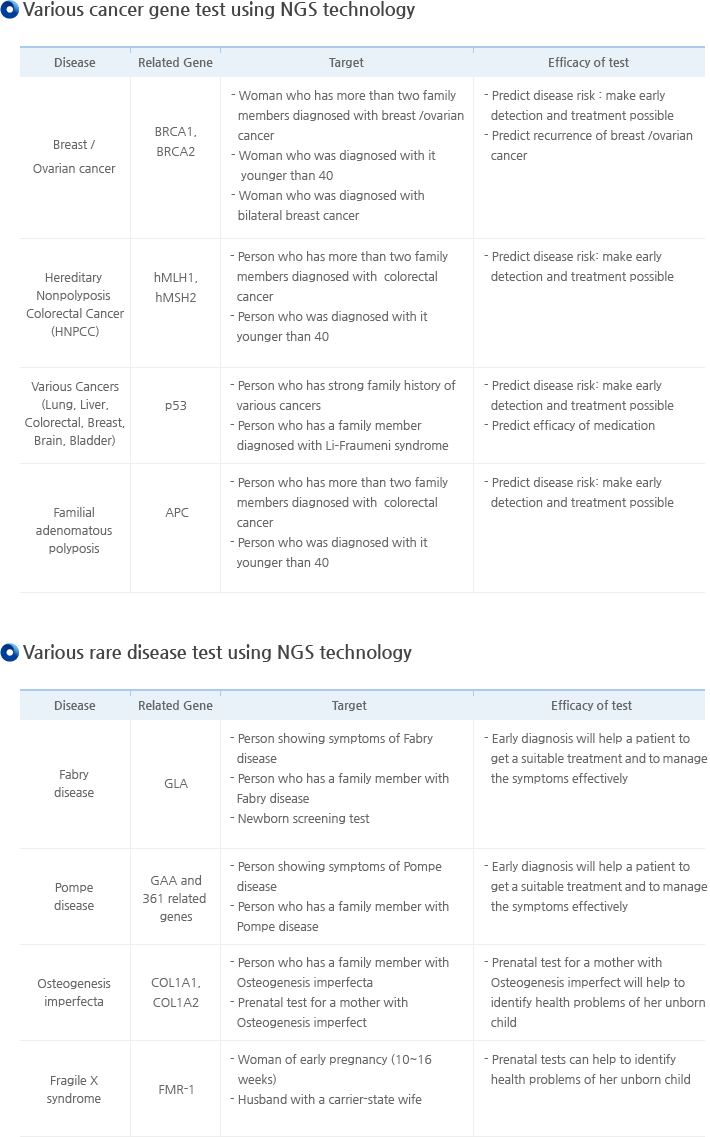비쥬얼
Disease predisposition
- Various Cancer Gene Test :
-
Breast / Ovarian cancer, Hereditary Nonpolyposis Colorectal Cancer (HNPCC), Various
Cancers (Lung, Liver, Colorectal, Breast, Brain, Bladder), Familial adenomatous polyposis
- Rare Disease Test :
- Fabry, Pompe, Osteogenesis imperfect, Fragile X syndrome

Hereditary Nonpolyposis Colorectal Cancer (HNPCC)
HNPCC is an autosomal dominant genetic disorder that has a high risk of colon cancer as well as other cancers
including ovary, stomach, small intestine, brain, and skin. HNPCC accounts for 2-5% of all colorectal carcinomas.
It is caused by inherited mutations that damage DNA mismatch repair. Parents with HNPCC have a 50% chance
of passing the genetic mutation on to each child.
including ovary, stomach, small intestine, brain, and skin. HNPCC accounts for 2-5% of all colorectal carcinomas.
It is caused by inherited mutations that damage DNA mismatch repair. Parents with HNPCC have a 50% chance
of passing the genetic mutation on to each child.
Familial adenomatous polyposis (FAP)
FAP is a rare, inherited disorder in which numerous adenomatous polyps develop mainly in the epithelium of
the large intestine. While these polyps start out benign, if left untreated, they could turn into colon cancer.
Most people with FAP eventually need surgery to remove the upper part of colon to prevent cancer.
The reported incidence of FAP varies from 1 in 7,000 to 1 in 22,000 individuals.
the large intestine. While these polyps start out benign, if left untreated, they could turn into colon cancer.
Most people with FAP eventually need surgery to remove the upper part of colon to prevent cancer.
The reported incidence of FAP varies from 1 in 7,000 to 1 in 22,000 individuals.
Fabry Disease
Fabry disease results from a deficiency of the lysosomal enzyme, α-galactosidase A (α-Gal A). When α-Gal A does
not function, a fatty lipid GL3 gathers in the walls of blood vessels in tissues throughout the body, hampering
with their function. This disorder is X-linked disorders, transmitted only on the X chromosome. If males receive
the defective gene on this chromosome, they will have symptoms. This disease affects around 1 in 40,000 males.
Females seldom show symptoms of the disease since they can carry the gene on one of their two X chromosomes.
However, they can be severely affected if the dominant X chromosome does not function properly. Symptoms of
Fabry disease include kidney, heart, cerebrovascular abnormalities, neurological complications, cardiovascular
abnormalities, skin, and gastrointestinal disturbances.
not function, a fatty lipid GL3 gathers in the walls of blood vessels in tissues throughout the body, hampering
with their function. This disorder is X-linked disorders, transmitted only on the X chromosome. If males receive
the defective gene on this chromosome, they will have symptoms. This disease affects around 1 in 40,000 males.
Females seldom show symptoms of the disease since they can carry the gene on one of their two X chromosomes.
However, they can be severely affected if the dominant X chromosome does not function properly. Symptoms of
Fabry disease include kidney, heart, cerebrovascular abnormalities, neurological complications, cardiovascular
abnormalities, skin, and gastrointestinal disturbances.
Pompe Disease
Pompe disease is caused by the lack of alpha-glucosidase that breaks down complex sugar called glycogen
effectively. It causes the build up glycogen to toxic levels in the body's cells. This accumulation damages
organs and tissues throughout the body, particularly the muscles. This disease is known to affect about 1
in 50,000 people worldwide. Most patients experience muscle weakness, enlarged liver and heart defects.
effectively. It causes the build up glycogen to toxic levels in the body's cells. This accumulation damages
organs and tissues throughout the body, particularly the muscles. This disease is known to affect about 1
in 50,000 people worldwide. Most patients experience muscle weakness, enlarged liver and heart defects.
Osteogenesis imperfecta (OI)
OI is a congenital bone disease characterized by brittle bones that are prone to fracture. People with OI are
born with defective connective tissue, or without the ability to make it, usually due to a lack of type I collagen.
OI is known to occur in about one per 20,000 live births in western countries. The estimated incidence of
OI is approximately 20-25 live births in Korea.
born with defective connective tissue, or without the ability to make it, usually due to a lack of type I collagen.
OI is known to occur in about one per 20,000 live births in western countries. The estimated incidence of
OI is approximately 20-25 live births in Korea.
Fragile X syndrome (FXS)
FXS is the most common form of inherited mental retardation associated with the expansion of the CGG
trinucleotide repeat affecting the Fragile X mental retardation 1 (FMR1) gene on the X chromosome.
FXS occurs in approximately 1 in 2,000~4,000 males and 1 in 4,000~8,000 females. People with FXS usually
experience a range of developmental and learning problems including developmental delays, autism, attention
problems or hyperactivity. Most affected males have moderate-to-severe learning disabilities with IQs under
50 whereas most females have IQs of 70-85.
trinucleotide repeat affecting the Fragile X mental retardation 1 (FMR1) gene on the X chromosome.
FXS occurs in approximately 1 in 2,000~4,000 males and 1 in 4,000~8,000 females. People with FXS usually
experience a range of developmental and learning problems including developmental delays, autism, attention
problems or hyperactivity. Most affected males have moderate-to-severe learning disabilities with IQs under
50 whereas most females have IQs of 70-85.











